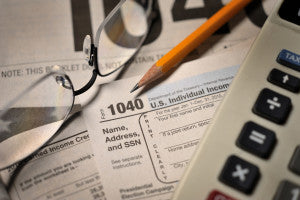
It’s income tax season. Hooray. That’s almost as exciting as, say, tooth-drilling season. Still, experts recommend you file taxes as soon as possible, especially if you’re one of the 70 percent of Americans who will
get an income tax refund. Filing early helps prevent taxpayers from becoming victims of tax fraud, since fraudsters prefer to file early, according to American Fork, Utah-based tax accountant Michael Robertson. Also,
some online tax preparation software’s prices increase as the tax deadline approaches. And those who owe income taxes will avoid penalties for late filing and paying.
"For this tax season, it's more important than ever for taxpayers to plan ahead," IRS Commissioner John Koskinen
said in a release.
Here’s how to plan ahead.
First, organize throughout the year, Robertson says.
“Seeing a folder that is packed full of a whole bunch of disorganized stuff is scary,” Robertson said. “Seeing (a file) with almost nothing in it is also scary.”
Tax preparers hate going through their clients’ “shoebox” – a nickname for a disorganized file – because it takes much more time for the tax preparer to organize it than for the taxpayer.
“If you do business every day, then every day you put something in a ledger that says, ‘Here’s income, and here’s expenses, broken out, instead of just throwing a receipt into a pile,” he said.
That practice makes tabulating profits and losses a cakewalk.
“Anybody can use a calculator,” Robertson said.
The same goes for individual taxpayers. If you donate household goods to a nonprofit, for example, you can take a
tax deduction. But list donated items and calculate their value before you donate, Robertson said, so you’re not going back at the end of the year trying to remember what you donated, when you did it and how much it was worth.
If clients don’t organize information, “It just means we’re going to spend a lot of time, and it’s just going to be time we charge to the client,” Robertson said. “They’re paying us to add stuff up.”
Tax preparers also hate not having enough information.
One woman brought Robertson her business’s bank statements for the year. While they were useful – especially because she put them in a spreadsheet -- he couldn’t always figure out what each line on the statements represented – was that purchase at, say, Costco, for office supplies?
“I don’t know what to do with this. I can guess. They’re paying me to do that when they could do it much more quickly and not have to be charged for it,” he said.

Keeping tax information organized is also useful because much of the financial information you need to file your taxes is necessary after a disaster.
The Federal Emergency Management Agency recommends keeping copies of the last few years’ tax returns.
“Tax returns from the previous three years may be required to apply for some new loans,”
FEMA’s Emergency Financial First Aid Kit noted.
The IRS also recommends keeping copies of the last three years’ tax returns. Taxpayers who change tax software this year will need their 2015 tax return’s adjusted gross income to file electronically,
the IRS said.
Social security numbers, bank information, mortgage documentation, investment papers, alimony payments and student loan information are also necessary for both tax filing and emergency recovery.
So,
while you’re gathering tax information, take time to fill out FEMA’s
Financial First Aid Kit. Then, every year as you prepare to file taxes, update the Financial First Aid Kit, too.
“People who are organized in taxes are usually organized in other areas. If they understand financially where they are, then that certainly helps them with other aspects of life,” Robertson said. “It seems like organization in one area bleeds over to organization in another.”

 It’s income tax season. Hooray. That’s almost as exciting as, say, tooth-drilling season. Still, experts recommend you file taxes as soon as possible, especially if you’re one of the 70 percent of Americans who will get an income tax refund. Filing early helps prevent taxpayers from becoming victims of tax fraud, since fraudsters prefer to file early, according to American Fork, Utah-based tax accountant Michael Robertson. Also, some online tax preparation software’s prices increase as the tax deadline approaches. And those who owe income taxes will avoid penalties for late filing and paying.
"For this tax season, it's more important than ever for taxpayers to plan ahead," IRS Commissioner John Koskinen said in a release.
Here’s how to plan ahead.
First, organize throughout the year, Robertson says.
“Seeing a folder that is packed full of a whole bunch of disorganized stuff is scary,” Robertson said. “Seeing (a file) with almost nothing in it is also scary.”
Tax preparers hate going through their clients’ “shoebox” – a nickname for a disorganized file – because it takes much more time for the tax preparer to organize it than for the taxpayer.
“If you do business every day, then every day you put something in a ledger that says, ‘Here’s income, and here’s expenses, broken out, instead of just throwing a receipt into a pile,” he said.
That practice makes tabulating profits and losses a cakewalk.
“Anybody can use a calculator,” Robertson said.
The same goes for individual taxpayers. If you donate household goods to a nonprofit, for example, you can take a tax deduction. But list donated items and calculate their value before you donate, Robertson said, so you’re not going back at the end of the year trying to remember what you donated, when you did it and how much it was worth.
If clients don’t organize information, “It just means we’re going to spend a lot of time, and it’s just going to be time we charge to the client,” Robertson said. “They’re paying us to add stuff up.”
Tax preparers also hate not having enough information.
One woman brought Robertson her business’s bank statements for the year. While they were useful – especially because she put them in a spreadsheet -- he couldn’t always figure out what each line on the statements represented – was that purchase at, say, Costco, for office supplies?
“I don’t know what to do with this. I can guess. They’re paying me to do that when they could do it much more quickly and not have to be charged for it,” he said.
It’s income tax season. Hooray. That’s almost as exciting as, say, tooth-drilling season. Still, experts recommend you file taxes as soon as possible, especially if you’re one of the 70 percent of Americans who will get an income tax refund. Filing early helps prevent taxpayers from becoming victims of tax fraud, since fraudsters prefer to file early, according to American Fork, Utah-based tax accountant Michael Robertson. Also, some online tax preparation software’s prices increase as the tax deadline approaches. And those who owe income taxes will avoid penalties for late filing and paying.
"For this tax season, it's more important than ever for taxpayers to plan ahead," IRS Commissioner John Koskinen said in a release.
Here’s how to plan ahead.
First, organize throughout the year, Robertson says.
“Seeing a folder that is packed full of a whole bunch of disorganized stuff is scary,” Robertson said. “Seeing (a file) with almost nothing in it is also scary.”
Tax preparers hate going through their clients’ “shoebox” – a nickname for a disorganized file – because it takes much more time for the tax preparer to organize it than for the taxpayer.
“If you do business every day, then every day you put something in a ledger that says, ‘Here’s income, and here’s expenses, broken out, instead of just throwing a receipt into a pile,” he said.
That practice makes tabulating profits and losses a cakewalk.
“Anybody can use a calculator,” Robertson said.
The same goes for individual taxpayers. If you donate household goods to a nonprofit, for example, you can take a tax deduction. But list donated items and calculate their value before you donate, Robertson said, so you’re not going back at the end of the year trying to remember what you donated, when you did it and how much it was worth.
If clients don’t organize information, “It just means we’re going to spend a lot of time, and it’s just going to be time we charge to the client,” Robertson said. “They’re paying us to add stuff up.”
Tax preparers also hate not having enough information.
One woman brought Robertson her business’s bank statements for the year. While they were useful – especially because she put them in a spreadsheet -- he couldn’t always figure out what each line on the statements represented – was that purchase at, say, Costco, for office supplies?
“I don’t know what to do with this. I can guess. They’re paying me to do that when they could do it much more quickly and not have to be charged for it,” he said.
 Keeping tax information organized is also useful because much of the financial information you need to file your taxes is necessary after a disaster.
The Federal Emergency Management Agency recommends keeping copies of the last few years’ tax returns.
“Tax returns from the previous three years may be required to apply for some new loans,” FEMA’s Emergency Financial First Aid Kit noted.
The IRS also recommends keeping copies of the last three years’ tax returns. Taxpayers who change tax software this year will need their 2015 tax return’s adjusted gross income to file electronically, the IRS said.
Social security numbers, bank information, mortgage documentation, investment papers, alimony payments and student loan information are also necessary for both tax filing and emergency recovery.
So, while you’re gathering tax information, take time to fill out FEMA’s Financial First Aid Kit. Then, every year as you prepare to file taxes, update the Financial First Aid Kit, too.
“People who are organized in taxes are usually organized in other areas. If they understand financially where they are, then that certainly helps them with other aspects of life,” Robertson said. “It seems like organization in one area bleeds over to organization in another.”
Keeping tax information organized is also useful because much of the financial information you need to file your taxes is necessary after a disaster.
The Federal Emergency Management Agency recommends keeping copies of the last few years’ tax returns.
“Tax returns from the previous three years may be required to apply for some new loans,” FEMA’s Emergency Financial First Aid Kit noted.
The IRS also recommends keeping copies of the last three years’ tax returns. Taxpayers who change tax software this year will need their 2015 tax return’s adjusted gross income to file electronically, the IRS said.
Social security numbers, bank information, mortgage documentation, investment papers, alimony payments and student loan information are also necessary for both tax filing and emergency recovery.
So, while you’re gathering tax information, take time to fill out FEMA’s Financial First Aid Kit. Then, every year as you prepare to file taxes, update the Financial First Aid Kit, too.
“People who are organized in taxes are usually organized in other areas. If they understand financially where they are, then that certainly helps them with other aspects of life,” Robertson said. “It seems like organization in one area bleeds over to organization in another.”


